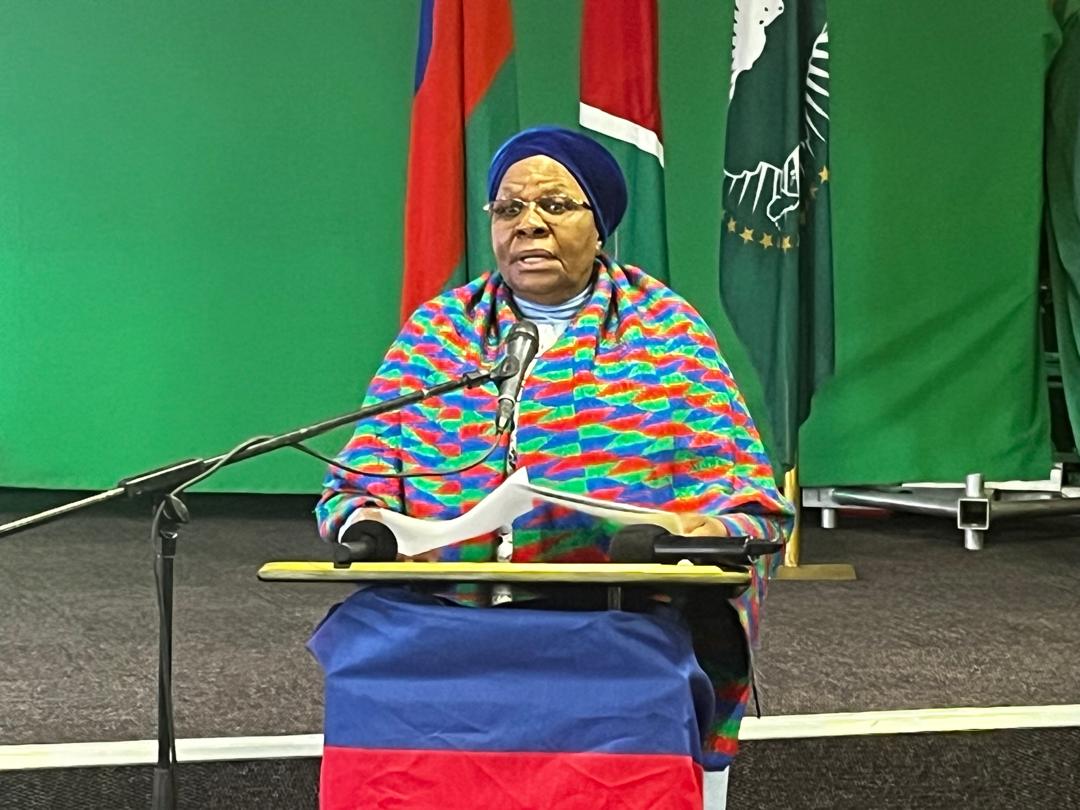19 June 2024
It is with great pleasure and honour that I stand before you today as we launch the Tripartite One Health National Strategy for Namibia.
This initiative represents a significant step forward in our collective efforts to ensure the health and well-being of humans, fauna, and the natural environment.
Zoonotic diseases that occur at the human-animal- environment interface, such as rabies and food-borne diseases, continue to have a major impact on health, livelihoods, and economies. Many countries recognise the benefits of taking a One Health approach to build national mechanisms for coordination, communication, and collaboration to respond to and address these public health threats.
A global increase in emerging and re-emerging pathogens has caused significant strain on public health systems in recent years, particularly in developing countries. Zoonotic and vector-borne pathogens have a severe impact, causing substantial human morbidity and mortality, and a loss of income due to suspended trade in animals and animal products.
There is also reduced biodiversity through the loss of wildlife, especially among resource- constrained communities who rely on their environments for survival.
Factors contributing to the increasing burden of these diseases include growth in human and animal populations, the degradation of wildlife habitats, the spread of pathogens through international travel and trade, changing farming systems, irregular urbanisation patterns, harmful cultural practices, poverty, and climate change.
The International Health Regulations of 2005 came into force in 2007. Since 2007, there have been six declarations of Public Health Emergencies of International Concern (PHEIC), starting with the H1N1 influenza in 2009.
In subsequent years, the world recorded several disease outbreaks and public health emergencies, such as Zika, cholera and Ebola, and the re-emergence of other infections. Namibia was not spared.
The country has experienced a significant number of outbreaks in the past years, such as cholera, anthrax, Crimean Congo haemorrhagic fever, avian Influenza in migratory birds, hepatitis E, foodborne illnesses, vector-borne diseases like malaria, and recently the Covid-19 pandemic with high morbidity and mortality.
According to the United Nations quadripartite organisations – which are the World Health Organisation (WHO), United Nations Environment Programme (Unep), the Food and Agriculture Organization (FAO), and the World Organisation on Animal Health (Woah) – One Health is defined as an integrated, unifying approach that aims to sustainably balance and optimise the health of humans, animals, plants, and ecosystems.
This approach recognises that the health of humans, domestic and wild animals, plants, and the wider environment, including ecosystems, are closely linked and interdependent.
Within the Namibian context, the need for the One Health approach is evidenced by the frequent reported outbreaks of zoonotic disease, coupled with the effects of climate change.
The One Health approach is indeed crucial, as reports indicate that 75% of emerging pathogens that are known to cause epidemics affecting humans are of zoonotic origin, meaning they are transmitted from animals.
Our country is experiencing worrying impacts of climate change and environmental land-use changes. These include bush encroachment, sporadic flooding and frequent droughts. All of these impact arthropod and wildlife distributions, human well-being, ecosystem integrity and resilience, and consequently contribute to the proliferation of vector-borne pathogens and diseases.
With the abundance of wildlife and livestock in the country, there is an increase in human-wildlife conflict in shared environments. Moreover, many zoonotic diseases have been reported, including anthrax, foot-and-mouth disease, brucellosis, Crimean Congo haemorrhagic fever (CCHF), and other tick-borne pathogens.
The One Health interventions in Namibia cut across the ministries of health and social services, environment, forestry and tourism and agriculture, water and land reform.
For the country to ensure effective and timely preparedness and response to public health emergencies, these three ministries, along with the University of Namibia and other key stakeholders, have developed the National Tripartite One Health Strategy (2024-2028).
Following a validation meeting in February 2023, the strategy document was developed through a consultative process with subject-matter experts from the human, environmental, and animal health sectors, researchers, and policy formulators at the regional and county levels.
Namibia’s National Tripartite One Health Strategy is aligned to the One Health Joint Plan of Action (OH JPA) (2022–2026) developed by the UN quadripartite organisations. It also aligns with the country’s priorities outlined in the National Action Plan for Health Security (NAPHS), the National Development Plans (NDP), as well as the Harambee Prosperity Plans and Vision 2030.
According to the joint external evaluation carried out in 2016, and the State Party Annual Report on IHR Core Capacities of 2023, respectively, there is a need to strengthen and improve Namibia’s One Health capacities and collaborative efforts across sectors to address zoonosis.
This highlights the need to accelerate actions to strengthen the One Health multisectoral coordinating mechanism that will be guided by this Tripartite One Health National Strategy.
There is no doubt that progress towards global health security requires a greater focus on the interface between humans and animals. There is also a need for strong collaboration on interventions on human health and the animal health sectors.
This is highlighted in the Tripartite One Health National Strategy we are launching.
The government of Namibia, through the budget allocations to relevant offices, ministries and agencies, will allocate an amount of more than N$4 050 136 annually to support the implementation of the One Health Strategy.
This translates to N$16 200 544 over the strategy’s four-year implementation period. This amount will cover direct allocation to specific interventions in the priority sectors, activities for the implementation of the National Plan of Action for Health Security (NAPHS), and other sector-related operational costs.
I emphasise that a diversity of stakeholders will be required to be involved during the implementation of this strategy. The roles of each institution will vary from providing leadership to the implementation of activities. Multisectoral collaboration is critical for the successful implementation of this strategy, involving the different institutions and organisation. This is what we mean when we talk about the whole-of-government and whole-of-society approach to policymaking and policy implementation.
The implementation of the Tripartite One Health National Strategy will be reviewed annually by the One Health multisectoral coordinating committee, and its activities will be integrated into the implementation of existing strategies, such as the national action plan for health security, the integrated disease surveillance and response, the control of neglected tropical diseases, event-based surveillance, antimicrobial resistance, as well as veterinary and wildlife disease control interventions.
The interventions will be further linked to the existing functions of the IHR National Focal Point. It is important to note that the implementation of the strategy will be monitored and evaluated regularly to ensure that the plan is effectively implemented at all levels.
I hereby re-affirm the government’s commitment and support to the One Health approach, adapted to the Namibian context, for the prevention, detection, preparedness and response to public health threats. Namibia is currently working towards the establishment of the Namibia Institute of Public Health (NIPH) that will play an important role in the coordination of our country’s preparedness and response to public health emergencies.
The ministries of health and social services, agriculture, water and land reform and environment tourism and forestry, will sign a memorandum of understanding (MoU) on One Health tripartite collaboration and coordination to ensure the effective implementation of the interventions outlined in the Tripartite One Health National Strategy.
In closing, I express our gratitude to the Africa Centres for Disease Control and Prevention for the financial and technical support in the development of this strategy. I further acknowledge and thank the various local and international stakeholders who were instrumental in the strategy’s development: the Ministry of Agriculture, Water and Land Reform, the Ministry of Environment, Forestry and Tourism, the Ministry of Health and Social Services, the Office of Prime Minister, the University of Namibia through the Capacitating One Health in Eastern and Southern Africa Project, the Food and Agriculture Organisation, the World Health Organisation, the Friedrich Loeffler Institute, the Robert Koch Institute, the Namibia University of Science and Technology, the Namibia Institute of Pathology, the United States Centres for Disease Control and Prevention.
Stay informed with The Namibian – your source for credible journalism. Get in-depth reporting and opinions for
only N$85 a month. Invest in journalism, invest in democracy –
Subscribe Now!






